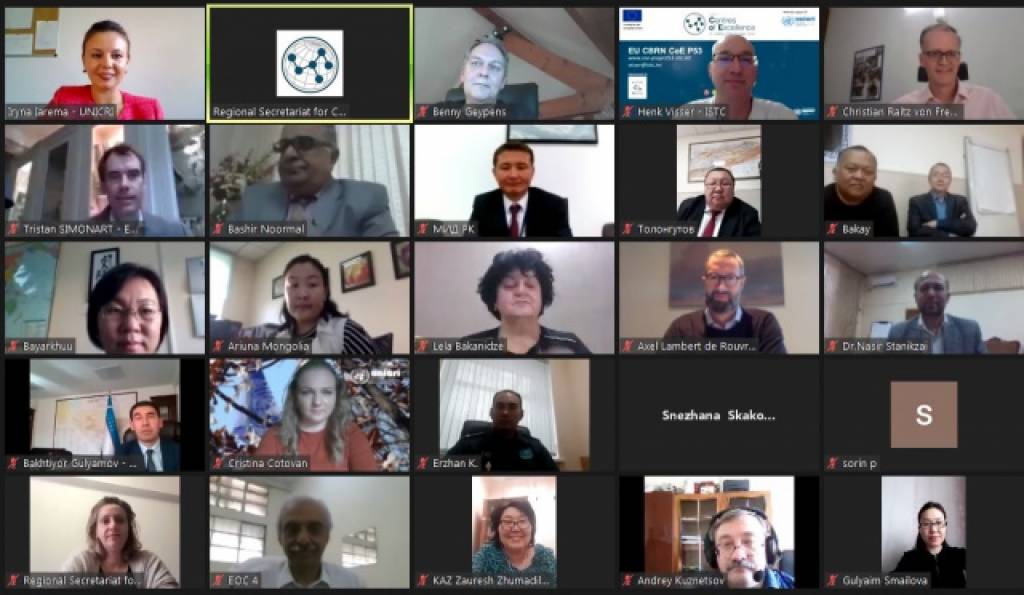EU CBRN CoE Initiative: National Focal Points of Central Asia discuss key successes and challenges

Virtual 13th Round-Table Meeting (RTM) for Central Asia took place via videoconference on 27 October 2020.
Within the framework of the European Union Chemical, Biological, Radiological and Nuclear Centres of Excellence (EU CBRN CoE) Initiative, the Virtual 13th Round-Table Meeting (RTM) for Central Asia took place via the online Zoom videoconferencing platform on 27 October 2020. The aim of the meeting was to discuss the current COVID-19 situation and key successes and challenges faced by the Partner Countries of the region during the COVID-19 pandemics, to exchange the latest developments in the area of CBRN risks and incidents in partner countries, and to present the second version of the draft CBRN Regional Action Plan (RAP) for Central Asia, as well as to discuss and agree on the regional priorities for the future regional EU CBRN CoE project.
The meeting kicked off with welcoming remarks by Mr. Bakhtiyor Gulyamov, Head of Secretariat for Central Asia, Chairman of the State Committee on Industrial Safety of the Republic of Uzbekistan. During his speech, Mr. Gulyamov noted “the Regional Secretariat for Central Asia continued to operate incessantly and carried out considerable work despite the difficulties caused by COVID-19”. He also mentioned contribution made by the EU CBRN Initiative to the Partner Countries to fight the coronavirus via EU CBRN CoE Project 53 on “Strengthening the National Legal Framework and Provision of Specialized Training on Bio-safety and Bio-security in Central Asian Countries”. Mr. Gulyamov specified that within the said project, “personal protective equipment, laboratory accessories, diagnostic kits, distance learning systems, extraction and decontamination equipment and other supplies were already purchased and delivered (or planned for delivery) to Partner Countries”. The NFPs highly appreciated the support provided through the reinforced Project 53 to reflect on the lessons learned and increase the capacity for combating coronavirus in Central Asia, as well as in South-East and Eastern Europe and noted the timeliness and appropriateness of the activities.
Mr. Tristan Simonart, CBRN CoE Programme Manager for Central Asia, EU CBRN Risk Mitigation Centres of Excellence, Directorate-General for International Cooperation and Development (DG DEVCO), European Commission (EC), commended progress achieved in developing the CBRN RAP for Central Asia. He noted that “CBRN RAP for Central Asia is one of the first comprehensive documents of its kind within the Initiative providing the policy framework to guide the creation and maintenance of sustainable capabilities and common standards in CBRN policies, programmes, equipment and training in the region”. Mr. Simonart encouraged Partner Countries in launching a new regional project in line with previously identified regional priorities, namely: Rapid Alert Systems, CBRN safety/security during mass gatherings, and CBRN food defence, while safeguarding finalisation of the proposal according to countries’ needs. He also emphasized the “global impact of the EU CBRN CoE Initiative in promoting stability and multilateralism” and informed on the forthcoming changes in the administration of the EU CBRN CoE programme, namely, its transfer to the new EU service – the Foreign Policy Instrument – aimed at helping countries cope with crises and maintain peace, security, law and order.
The National Focal Points (NFPs) and experts from six partner-countries of the Region: the Islamic Republic of Afghanistan, the Kyrgyz Republic, Mongolia, the Islamic Republic of Pakistan, the Republic of Tajikistan and the Republic of Uzbekistan, representatives of the International Science and Technology Center, EU Delegations in the region, EC Joint Research Centre (JRC), United Nations Interregional Crime and Justice Research Institute (UNICRI) took part in the virtual regional RTM. Public officials of the Ministry of Foreign Affairs and other relevant ministries of the Republic of Kazakhstan as well as representatives of the Almaty-based Aikimbayev’s National Scientific Center for Especially Dangerous Infections of the Ministry of Healthcare of the Republic of Kazakhstan also participated in the RTM. In this regard, Ms. Iryna Iarema, Regional Coordinator for Central Asia (UNICRI) noted, “There is a strong anticipation that this event will further enhance our cooperation, build stronger ties within the region and the Initiative and also eventually lead to the accession of the Republic of Kazakhstan to the Initiative.”
The online regional RTM was organized by the CBRN CoE Regional Secretariat for Central Asia in close cooperation with the EC DG DEVCO and the UNICRI.
Background information:
The EU CBRN CoE Initiative is funded by the European Commission and implemented in cooperation with the United Nations Interregional Crime and Justice Research Institute (UNICRI) and the European Commission Joint Research Centre (JRC). The European External Action Service is also involved in the follow-up to the initiative. The initiative is developed with the technical support of relevant international and regional organizations, the EU Member States, and other stakeholders, through coherent and effective cooperation at the national, regional and international level. The initiative involves over 60 countries in eight regions of the world.